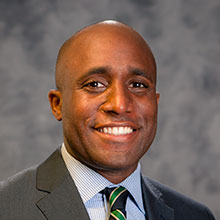This website uses cookies
We use cookies to ensure that we give you the best experience on our website. If you continue to use this site we will assume that you are happy with it.

Quinton Lucas.
On August 1, Quinton Lucas ’09 was sworn in as the new mayor of Kansas City, Missouri. He won the mayoral race on June 18, beating opponent Jolie Justus by 18 points.
Lucas was born in Kansas City and grew up in its urban core with his mother and sisters, moving frequently and experiencing homelessness. He went on to earn academic scholarships to the Barstow School, Washington University, and Cornell Law School.
After earning his J.D., Lucas returned to Kansas City, first clerking for Judge Duane Benton on the Eighth District of the U.S. Court of Appeals and then representing Fortune 500 businesses as well as local start-ups with firm German May. In 2012, he joined the University of Kansas faculty at age twenty-eight, making him one of the youngest tenure-track law professors in the country. He also served on the Kansas City council from 2015 to 2019.
During his run for mayor, Lucas was endorsed by the local police, fire, and teachers’ unions, as well as the Kansas City Star, whose editorial board wrote, “He has led his council colleagues and successfully built majority coalitions on desperately needed incentive reform and housing initiatives.”
At his inauguration, Lucas identified a list of priorities for the city, including free public bus access, affordable housing, and better compensation for government employees, but his greatest emphasis landed on public safety.
“For almost every year of my life, Kansas City has been on the list of America’s most dangerous cities,” he said. “I don’t want [us] to be a city where we have ribbon-cuttings about stadiums or big infrastructure projects but simply shrug about the violence in our streets; the mental illness we deal with, particularly among the homeless; and the drug addictions that plague our city every day. And all I can say is this: public safety is expensive, but the value of human life is much greater.”